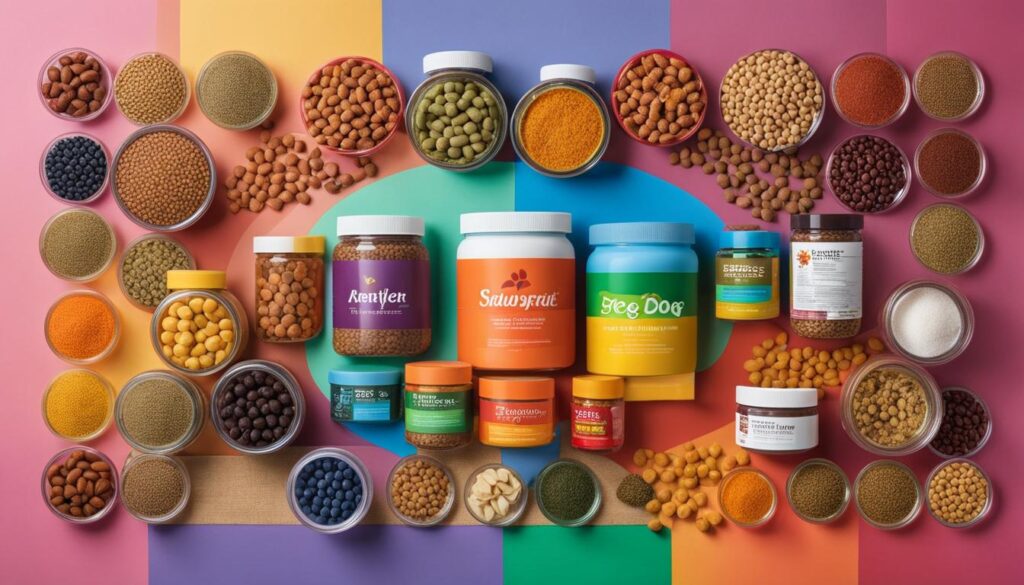When it comes to improving your dog’s diet, incorporating nutritional supplements can provide a much-needed boost to their overall health and well-being. Homemade dog food recipes are becoming increasingly popular among pet owners who want to have more control over their dog’s nutrition. However, it’s important to ensure that any homemade diet is nutritionally balanced and meets your dog’s specific needs. Adding supplements to their diet can help fill any nutritional gaps and ensure they get all the vitamins, minerals, and nutrients they require.
Key Takeaways:
- Incorporating nutritional supplements can improve your dog’s overall health and well-being.
- Homemade dog food recipes allow for more control over your dog’s nutrition.
- It’s important to ensure that any homemade diet is balanced and meets your dog’s specific needs.
- Supplements can help fill nutritional gaps and provide essential vitamins, minerals, and nutrients.
- Consult with a veterinary nutritionist to determine the best supplements for your dog’s diet.
The Benefits of Homemade Dog Food
When it comes to your dog’s diet, homemade food offers several advantages over commercial pet food. By preparing homemade dog food, you have the opportunity to customize your furry friend’s meals according to their specific health concerns and dietary needs. You can use whole food ingredients, ensuring that your dog receives minimally processed meals that are rich in nutrients. Moreover, you have full control over the quality and sourcing of the ingredients, providing peace of mind in terms of food safety.
However, it’s crucial to work closely with a veterinary nutritionist when creating homemade dog food. They can help you formulate recipes that are nutritionally balanced and tailored to your dog’s unique requirements. While homemade food can provide many nutrients, it can still be challenging to meet all of your dog’s nutritional needs through home cooking alone. This is where supplements can play a vital role in filling any potential gaps and ensuring your dog receives all the essential vitamins and minerals.
To give your dog the best of both worlds, you can combine homemade meals with high-quality nutritional supplements. This way, you can provide a balanced diet that supports your dog’s overall health and well-being. Together, homemade dog food and supplements can give your four-legged companion the nutritional boost they need for a happy and healthy life.
The Importance of Whole Food Ingredients
When preparing homemade dog food, it’s essential to prioritize the use of whole food ingredients. Whole foods provide a wide range of nutrients that are readily available for your dog’s body to absorb and utilize. They are minimally processed, providing a more natural and wholesome option for your pet.
Incorporating whole food ingredients like lean meats, fruits, vegetables, and whole grains can help ensure your dog’s diet is nutritionally balanced. These ingredients offer essential vitamins, minerals, antioxidants, and fiber, promoting good health and supporting your dog’s immune system.
By choosing whole food ingredients for your homemade dog food recipes, you can provide your furry friend with the nourishment they need to thrive. Remember to consult with a veterinary nutritionist to ensure you’re using the right ingredients and proportions for your dog’s specific needs.
An Example of a Homemade Dog Food Recipe
“A wholesome and nutritious homemade dog food recipe that incorporates whole food ingredients is the following:
- 2 cups of cooked chicken breast, shredded
- 1 cup of cooked quinoa
- 1/2 cup of steamed carrots, diced
- 1/2 cup of steamed broccoli, chopped
- 1/4 cup of blueberries
- 1 tablespoon of flaxseed oil
Mix all the ingredients together in a large bowl and serve to your dog in appropriate portions. This recipe provides a balanced combination of protein, carbohydrates, and essential nutrients. As always, consult with a veterinary nutritionist to ensure this recipe is suitable for your dog’s specific dietary needs.”

Ensuring a Balanced Homemade Diet
Creating a nutritionally balanced homemade diet for your dog requires careful consideration and planning. It’s important to follow a dog food recipe formulated by a veterinary nutritionist to ensure your dog’s diet includes the right balance of protein, carbohydrates, fiber, and fat. While homemade food can provide many nutrients, it may still be challenging to meet all of your dog’s nutritional needs through home cooking alone. Adding a multivitamin for homemade dog food is often recommended to help balance out the nutrients and ensure your dog receives all the essential vitamins and minerals. It’s important to monitor your dog’s weight and overall health when making dietary changes and consult with a veterinary nutritionist if needed.
When it comes to a balanced homemade diet, remember that the perfect recipe should include high-quality protein sources, such as lean meats or fish, to support your dog’s muscle development and overall health. Carbohydrates, such as brown rice or sweet potatoes, can provide energy and essential nutrients. Including a variety of fruits and vegetables in your dog’s diet can introduce vital vitamins and minerals. It’s important to avoid harmful ingredients like chocolate, onions, or garlic, as they can be toxic to dogs. Instead, focus on incorporating safe and beneficial options like apples, blueberries, or carrots.
To ensure your dog’s homemade diet is nutritionally complete, consider adding a multivitamin specifically formulated for homemade dog food. This can help fill any nutritional gaps and provide the essential vitamins and minerals your dog may need. Look for a multivitamin that is made from whole food sources to ensure optimal absorption and effectiveness. Consult with a veterinary nutritionist to determine the appropriate dosage and specific needs of your dog based on their age, breed, and overall health.
| Nutrients | Sources | Functions |
|---|---|---|
| Protein | Chicken, beef, turkey, fish | Builds and repairs tissues, supports immune function |
| Carbohydrates | Brown rice, sweet potatoes, quinoa | Provides energy, aids digestion |
| Fiber | Pumpkin, green beans, broccoli | Promotes digestive health, regulates bowel movements |
| Fat | Salmon oil, coconut oil | Provides energy, supports healthy skin and coat |
Remember, a balanced homemade diet is just one piece of the puzzle. Regular exercise, proper hydration, and regular veterinary check-ups are also crucial for your dog’s overall health and well-being. By providing a nutritionally balanced homemade diet and ensuring their specific needs are met, you can give your furry friend the best chance at a long and healthy life.
Incorporating Fresh Foods and Vegetables
Adding fresh vegetables to your dog’s homemade diet can be a great way to provide them with additional nutrients and variety. Including a variety of vegetables in your dog’s meals ensures they receive a wide range of essential vitamins, minerals, and antioxidants for optimal health.
Some vegetables that are safe and beneficial for dogs include:
- Sweet potatoes: A great source of vitamins A, C, and B6, as well as dietary fiber.
- Carrots: Rich in beta-carotene, which supports eye health, and also provides vitamins A, K, and fiber.
- Butternut squash: A good source of vitamins A, C, and E, as well as dietary fiber.
- Spinach: Packed with iron, calcium, vitamins A, C, and K, and also contains antioxidants.
When incorporating vegetables into your dog’s diet, it’s important to avoid certain vegetables that can be toxic to dogs, such as onions, garlic, and bell peppers. Always consult with a veterinarian to ensure you’re feeding your dog safe and appropriate foods.
By including a variety of fresh, whole food ingredients in your dog’s meals, you can provide them with essential nutrients and help maintain a balanced diet. Remember to introduce new foods gradually and monitor your dog for any signs of allergies or digestive upset. Your furry friend will appreciate the added flavors and nutritional benefits of incorporating fresh vegetables into their homemade diet.
Choosing the Right Supplements for Your Dog
When it comes to keeping your furry friend healthy, incorporating the right supplements into their diet can make a world of difference. Dog supplements can provide the extra nutritional support your dog needs to thrive. Whether you’re looking to enhance joint health, improve skin and coat condition, or support overall well-being, there are a variety of options available to meet your dog’s specific needs.
One popular type of supplement is joint health supplements. These supplements are formulated to promote healthy joints, reduce inflammation, and improve mobility. They often contain ingredients like glucosamine, chondroitin, and omega-3 fatty acids, which can help support cartilage health and lubricate joints. If your dog is getting older or has a history of joint issues, adding a joint health supplement to their diet may provide the extra support they need.
In addition to joint health supplements, there are a wide range of other nutritional supplements available for dogs. Skin and coat supplements can help improve the condition of your dog’s skin and promote a shiny, healthy coat. Digestive health supplements, such as probiotics, can support a healthy gut microbiome and aid in digestion. It’s important to carefully research and select supplements that are made from high-quality, whole food sources to ensure maximum effectiveness and safety for your furry friend.
Table: Popular Dog Supplements
| Supplement Type | Benefits | Examples |
|---|---|---|
| Joint Health Supplements | Promote healthy joints, reduce inflammation, improve mobility | Glucosamine, chondroitin, omega-3 fatty acids |
| Skin and Coat Supplements | Improve skin condition, promote a shiny coat | Omega-3 fatty acids, biotin, vitamin E |
| Digestive Health Supplements | Support a healthy gut microbiome, aid in digestion | Probiotics, prebiotics, digestive enzymes |
| Overall Well-being Supplements | Support overall health and vitality | Multivitamins, antioxidants, herbal blends |
When choosing supplements for your dog, it’s important to consult with your veterinarian. They can help determine the right supplements for your dog’s specific needs and recommend appropriate dosages. Additionally, they can provide guidance on how supplements may interact with any existing medications your dog is taking and ensure there are no potential conflicts or adverse effects. Remember, supplements are meant to complement a well-balanced diet and should not be used as a replacement for proper nutrition.
By choosing the right supplements for your dog and incorporating them into their diet, you can help support their overall health and well-being. However, it’s important to remember that supplements are just one piece of the puzzle. A nutritious diet, regular exercise, and routine veterinary care are all essential for keeping your furry friend happy and healthy. So, take the time to research and select the best supplements for your dog, and enjoy watching them thrive!

The Benefits of Variety in Your Dog’s Diet:
- Ensures a wide range of essential nutrients
- Adds flavor and excitement to meals
- Promotes better overall health and well-being
- Reduces the risk of nutritional deficiencies
- Prevents mealtime boredom
Remember, a balanced and varied diet, along with appropriate supplementation, can help provide your dog with the nutrition they need for a happy and healthy life.
Ensuring Optimal Health with Supplemental Support
When it comes to supporting your dog’s overall health, incorporating the right supplements into their diet can make a significant difference. Omega-3 supplements are one such option that can provide numerous benefits. These supplements, often derived from fish oils or fresh fatty fish, contain essential fatty acids that promote a healthy inflammatory response, improve skin and coat health, and support overall well-being. Adding omega-3 supplements to your dog’s diet can be especially beneficial for dogs with allergies or skin conditions.
Probiotics for dogs are another type of supplement that can contribute to your furry friend’s well-being. Probiotics are beneficial bacteria that help support a healthy gut microbiome, improving digestion and nutrient absorption. By promoting the growth of good bacteria in the gut, probiotics can enhance your dog’s overall digestive health and strengthen their immune system. These supplements can be particularly beneficial for dogs with digestive issues or those who have recently undergone antibiotic treatments.
Several other canine supplements are available, each with their own specific benefits. Depending on your dog’s needs, you may consider supplements for joint health, cognitive function, or overall immune support. It’s important to choose supplements that are specifically formulated for dogs and consult with a veterinary nutritionist to determine the appropriate dosage for your dog’s size and health condition. By incorporating these targeted supplements into your dog’s diet, you can provide the extra support they need to thrive.
Table: Comparison of Common Canine Supplements
| Supplement | Benefits | Dosage |
|---|---|---|
| Omega-3 Fatty Acids | Promotes a healthy inflammatory response, improves skin and coat health | Follow recommended dosage based on your dog’s weight |
| Probiotics | Supports digestive health, strengthens the immune system | Follow recommended dosage based on your dog’s weight |
| Joint Health Supplements | Supports joint health and mobility, especially in senior dogs | Follow recommended dosage based on your dog’s weight |
| Cognitive Function Supplements | Supports brain health and cognitive function | Follow recommended dosage based on your dog’s weight |
Remember that supplements should complement a balanced and nutritious diet, rather than replace it. It’s important to consult with a veterinary professional to ensure the supplements you choose are appropriate for your dog’s specific needs and do not interact with any existing medications or health conditions. With the right combination of a wholesome diet and supplemental support, you can help ensure your dog’s optimal health and well-being.
Conclusion
Incorporating nutritional supplements into your dog’s diet can be a paw-some way to support their optimal health and maintain a balanced nutritional intake. By adding these supplements to homemade dog food recipes, you can provide your furry friend with the nutrients they need for a happy and healthy life.
Remember, it’s crucial to work with a veterinary nutritionist to ensure your dog’s diet is properly balanced and meets their specific needs. They can help you determine the right supplements to incorporate, such as omega-3 fatty acids for a healthy inflammatory response, probiotics for digestive health, and joint health supplements for improved mobility.
When choosing supplements, opt for those made from high-quality, whole food sources to maximize their effectiveness. Consult with a veterinary professional to establish the appropriate dosage and usage instructions for your dog’s size and health condition.
With the perfect combination of homemade nutrition and targeted supplements, you’ll be wagging your tail alongside your furry companion, knowing you’ve provided them with the best care possible.
FAQ
Can I just feed my dog homemade food without any supplements?
While homemade food can provide many nutrients, it may still be challenging to meet all of your dog’s nutritional needs through home cooking alone. Adding a multivitamin for homemade dog food is often recommended to help balance out the nutrients and ensure your dog receives all the essential vitamins and minerals.
Are there any vegetables I should avoid including in my dog’s homemade diet?
Yes, it’s important to avoid certain vegetables like onions, garlic, and bell peppers, as they can be toxic to dogs. Stick to safe and beneficial options such as sweet potatoes, carrots, butternut squash, and spinach.
How do I choose the right supplements for my dog?
Selecting the right supplements for your dog can be overwhelming. It’s important to choose supplements made from whole food sources rather than synthetic alternatives. Consider your dog’s specific needs, such as joint health, skin and coat health, digestive health, or overall well-being, and consult with a veterinary nutritionist for guidance.
Why is variety important in my dog’s diet?
Feeding your dog the same commercial kibble day after day can lead to nutritional deficiencies and health issues. Incorporating variety into your dog’s diet, such as homemade or raw food, can provide a wider range of nutrients and promote better overall health.
What supplements can I add to support my dog’s health?
Omega-3 fatty acids, probiotics for digestive health, and joint health supplements containing glucosamine and chondroitin are popular options. However, it’s essential to choose supplements specifically formulated for dogs and consult with a veterinary professional to determine the appropriate dosage for your dog’s size and health condition.
How do I ensure my dog’s diet is nutritionally balanced?
Creating a nutritionally balanced homemade diet for your dog requires careful consideration and planning. It’s crucial to follow a dog food recipe formulated by a veterinary nutritionist, work with a veterinary nutritionist to ensure your dog’s diet includes the right balance of nutrients, and monitor your dog’s weight and overall health when making dietary changes.
Why should I consider adding supplements to my dog’s homemade diet?
Incorporating nutritional supplements into your dog’s diet can help fill any nutritional gaps and support their overall health and well-being. Homemade dog food offers many benefits, but adding supplements can help ensure your dog gets all the vitamins, minerals, and nutrients they require.





